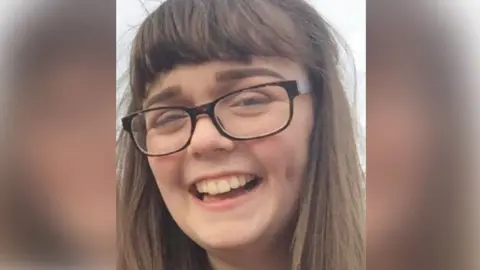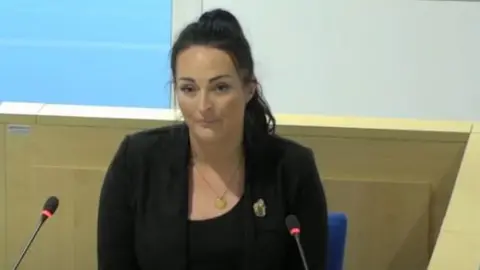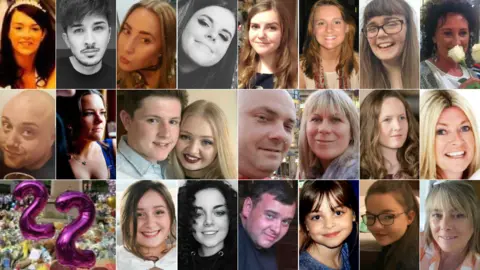Manchester Arena Inquiry: Nurse felt helpless in bomb aftermath
An off-duty nurse who tried to help casualties after the Manchester Arena attack has told how she felt helpless, lost and alone while waiting for help.
Bethany Crook was at the Ariana Grande concert with her daughter when a bomb was detonated on 22 May 2017.
She sobbed as she told the public inquiry she had "no equipment, some skills, my faith and hope".
The inquiry also heard that victim Georgina Callander, 18, was not taken to hospital for more than an hour.
Twenty-two people were killed and hundreds were injured when Salman Abedi set off a homemade device in the arena foyer as the concert ended.
 Manchester Arena Inquiry
Manchester Arena InquiryGiving evidence, Ms Crook said after the blast her 13-year-old daughter said to her: "Mum, you're a nurse help them."
"All I had before me were my two bare hands, no equipment, some skills, my faith and hope that somewhere there were people trying to get to us to help," she said.
"But this wasn't the case. No-one was coming and what may have been seconds to you all felt like minutes for me.
"What were minutes felt like hours and what were hours felt like an eternity alone with people and children's lives literally in my bare hands."
The inquiry heard Ms Crook helped various casualties, including Georgina and the youngest victim, eight-year-old Saffie-Rose Roussos.
"I just want Georgina's family to know and anybody else who I helped, I am very sorry for what happened, but despite the cause of their death everybody that was with them tried their best to make sure they were safe, secure and loved in that moment," she said.
"They were not alone."
Ms Crook told the inquiry that some members of the press had treated the aftermath of the attack as a "money-making machine".
 Manchester Arena Inquiry
Manchester Arena InquiryThe inquiry also heard that Georgina, from Tarleton in Lancashire, was the highest priority of all the patients but other casualties were moved first.
She was not taken out of the City Room, where the explosion happened, for 55 minutes, the hearing was told.
The teenager was then moved to the train station next door on a notice board before being transferred to an ambulance.
Paddy Ennis, who was a paramedic on the night of the attack, agreed with counsel for Georgina's father that the delay in moving her was unacceptable.
"I could not ensure that she was taken at the time but what I did was impress upon those who were in the process of extricating patients that she should be moved as soon as possible, so I then assumed that would happen," Mr Ennis said.
"I would agree that ideally she would have reached the Casualty Clearing Station much sooner than that.
"That was my intention and I am sorry that didn't happen."
 Family handouts
Family handoutsMr Ennis said he could have asked for more paramedics to come up and see Georgina in the foyer but said his "overwhelming desire throughout the time" was to move casualties down to Victoria station, where paramedics were due to arrive.
When the teenager arrived at hospital, she was given advanced life support treatment for 30 minutes before being pronounced dead.
Georgina's mother Lesley arrived at the arena just as her daughter was being moved and pleaded with medics not to give up on her, the inquiry heard.
In a tribute, Georgina's father said she had a "heart as big as the moon", while her mother said she had "an abundance of love for everyone".
The inquiry continues.

Analysis
By Sallie George, BBC News
For the past six days, the public inquiry has heard harrowing details about what happened to each of the 22 people who were killed in the atrocity.
Each person's experience has been examined in forensic detail, pieced together from CCTV images, body-worn camera footage and statements from witnesses.
In some cases, members of the public and professionals who tried to help those who died have given evidence, reliving the traumatic moments after the bomb went off.
Many of them have been thanked for their efforts by the families bereaved in the attack, who have sat in the hearings, listening to what happened to their loved ones.
And while this part of the inquiry has carefully sought to mark and pay tribute to each individual who lost their life, it has been a particularly difficult and distressing time for the relatives.
Of the 22 people who lost their lives, questions remain relating to whether two could have survived - the bombing's youngest victim Saffie-Rose Roussos, who was eight years old, and John Atkinson, who was 28.
Next week, the inquiry will start to examine their cases.

Why not follow BBC North West on Facebook, Twitter and Instagram? You can also send story ideas to [email protected]
